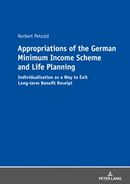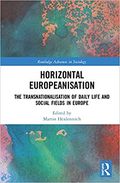Contact
Secretariate:
Latest Publications
Territorial and Social Inequalities in Europe
Challenges of European Integration

Heidenreich, Martin (Hg.) (2022)
This book examines social inequalities in Europe, especially those caused by economic factors. It starts with the paradox of European inequality, where on the one hand, even total income inequality in Europe is significantly lower than in most parts of the world; but on the other, Europe is also characterised by profound and durable inequalities within the continent. It discusses inequalities caused by the exclusion of marginalised groups from the labour market, with considerable and sometimes increasing differences between central and peripheral regions, pronounced wealth and labour market inequalities, and significant rates of persistent poverty, deprivation, educational poverty, low wages and unemployment. The book also discusses broader territorial inequalities, which are the basis for divisions between Northern and Southern Europe, East and West, between qualified and unqualified employees, younger and older people, men and women, and migrants and non-migrants. The book raises questions about the winners and losers of the social transformations linked to the introduction of the Euro, the Eastern enlargement of the EU, and the financial and Eurozone crises. It is based on a comprehensive analysis of a European-wide microdata set on income and living conditions (EU-SILC). The empirical research material, which is the first to deploy this data in a comprehensive manner, consists of detailed empirical analyses of social divisions and Europeanisation processes in 30 European countries. It analyses and explains the transformation of the previously dominant national spaces into a European social space.
This topical book is of interest to academics and students in the fields of sociology and comparative social sciences, along with those studying European regional geography, anthropology, international relations, and international politics.
Heidenreich, Martin (Hg.) (2022)
From an international perspective, income inequality in Europe is comparatively low and it is decreasing. Nevertheless, social and territorial inequalities threaten the social foundations of European integration and in particular the European Union (EU). This book argues that this paradox is the outcome of high levels of non-monetary inequalities, increasing inequalities for some regions and groups, and also the Europeanisation of social inequalities. This means that the generation, regulation and perception of social inequalities does not take place only at the national, but also at the European level. The more deeply the EU and the European integration intervene in the lives of Europeans, the more it also influences their life chances and the more they compare their situation with that of other Europeans. The book facilitates better understanding of this Europeanisation of social divisions by analysing the social and territorial patterns of social inequality in Europe, its Europeanisation and the cleavages between central and peripheral regions and advantaged and disadvantaged groups. Drawing on the EU Statistics on Income and Living Conditions, it is the first study of its kind to comprehensively analyse current trends of social inequality within and between countries in essential dimensions (employment and unemployment, wages, income, poverty and exclusion, education and wealth). This analysis shows that without a stronger focus on social cohesion the European integration undermines its basis, the support of its citizens. This has been become obvious in particular during the most recent crises of the EU.
Heidenreich, Martin (Ed.) (2019)
European integration has transformed the social life of European citizens. Daily life and work no longer take place primarily in a local and national context, but increasingly in a European and transnational frame a process of Horizontal Europeanisation which, while increasing the life chances of European citizens, also brings about conflicts among them. This book focuses on processes of Europeanisation in the academic, bureaucratic, professional and associational field, as well as on the Europeanisation of solidarity, networks and social inequalities. Drawing on detailed empirical studies and attending to the reinforcement of centre-periphery structures in Europe, it analyses the dynamics of horizontal Europeanisation processes, highlighting the crucial role of national practices and perceptions in a transnational context, as well as the related conflicts between the winners and losers in this process. As such, it will appeal to scholars of sociology and political science with interests in European integration, social change and social stratification.
Marie-Luise Assmann (2019)
Providing original insights into the factors causing early job insecurity in European countries, this book examines its short- and long-term consequences. It assesses public policies seeking to diminish the risks to young people facing prolonged job insecurity and reduce the severity of these impacts. Based on the findings of a major study across nine European countries, this book examines the diverse strategies that countries across the continent use to help young people overcome employment barriers.
Appropriations of the German Minimum Income Scheme and Life Planning

Norbert Petzold (2019)
Against the background of a high incidence of long-term benefit receipt and an increasing focus of interventions on the individual beneficiary, this study shows how individualised policies within the German minimum income scheme serve long-term beneficiaries as a way out of benefit receipt. By applying a qualitative research design, the link between individual appropriations of policies and individual life planning is reconstructed in the form of an empirically grounded typology. The analysis shows that individualised policies are ridden with prerequisites. Beneficiaries, that are not able to expertly appropriate them and to plan in the long-term, face unintended consequences like a limitation of life planning, a separation from the scheme or an establishment within entitlement.




